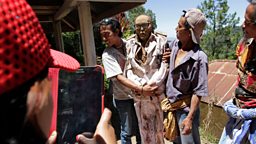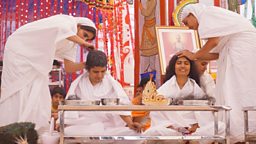What is a ritual?
By , Chief Consultant on the 大象传媒 Extraordinary Rituals Series and Professor of Social Anthropology, University of Oxford
Where humans really excel, though, is in their ability to imitate actions that have no practical value at all.
Ritual is what we do because that’s what everybody else does. Humans are amazing copycats. No other animal copies behaviour to the extent that we do. Our closest living relatives, chimpanzees, will copy each other to a limited degree, especially when they can see how a behaviour leads to some useful outcome. Some species of birds are extremely good at this kind of copying – members of the crow family, for example, are able to remember long sequences of actions necessary to extract food from a puzzle box.
Where humans really excel, though, is in their ability to imitate actions that have no practical value at all. This is what enables us to pass on fashions and traditions – behaviours that tell us what groups we belong to. This is really what we mean by ‘’ – actions that have to be performed simply because it’s the ‘done’ or ‘proper’ way to act in the group to which you happen to belong. The wearing of ‘big hair’ in Guizhou Province, Southwest China, is a great example of this.
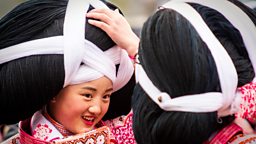
When we participate in rituals we demonstrate to other people that we are good citizens, committed to collective goals.
There鈥檚 no point joining in a ritual if you don鈥檛 want to affiliate with the group that performs it.
There’s no point joining in a ritual if you don’t want to affiliate with the group that performs it.
This can be especially obvious when groups compete with each other – for example by trying to drown out the opposition by chanting and singing at a football match or, in the ancient traditions of Siena, racing bareback on horses for the honour of your local community.
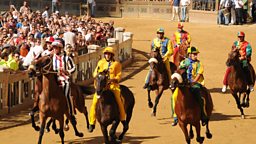
Rituals are often associated with stories and invested with symbolic properties. Sometimes, the meanings of the rituals are known only to appointed experts – who may or may not share their sacred knowledge with the rest of us.
Sometimes, the meanings of the rituals are known only to appointed experts
In other cases, the ritual participants themselves might try to seek out the inner meanings of the rituals, by reflecting on them independently. This kind of sacred journey is often apparent in spirit quests, initiations, and pilgrimages, as well as rituals that occur in awe inspiring settings such as the Snow Star Festival in the Peruvian Andes or the Burning Man festival in the desert of Nevada.
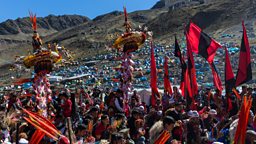
It’s easy to imagine that rituals are for people in the distant past or in exotic faraway places.

Sometimes that’s because our own behaviours are so familiar we scarcely notice that they are rituals at all. What we wear, how we greet each other, what and how we eat, these are always culturally distinctive rather than universal and unchanging.
The same applies to our particular ways of celebrating life event like births, marriages, deaths, to annual events like Christmas and Easter, through to more daily rituals like queuing at bus stops or dancing in nightclubs. All these things are rituals and we have them because we are hardwired to sponge them up and pass them on. Each time a child is born a new bearer of the community’s rituals is created.
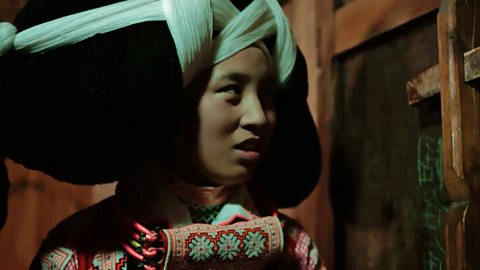
Singing for Love in China
Chinese teenagers giggle as they sing about pipes in ancient love songs at a dating ritual



